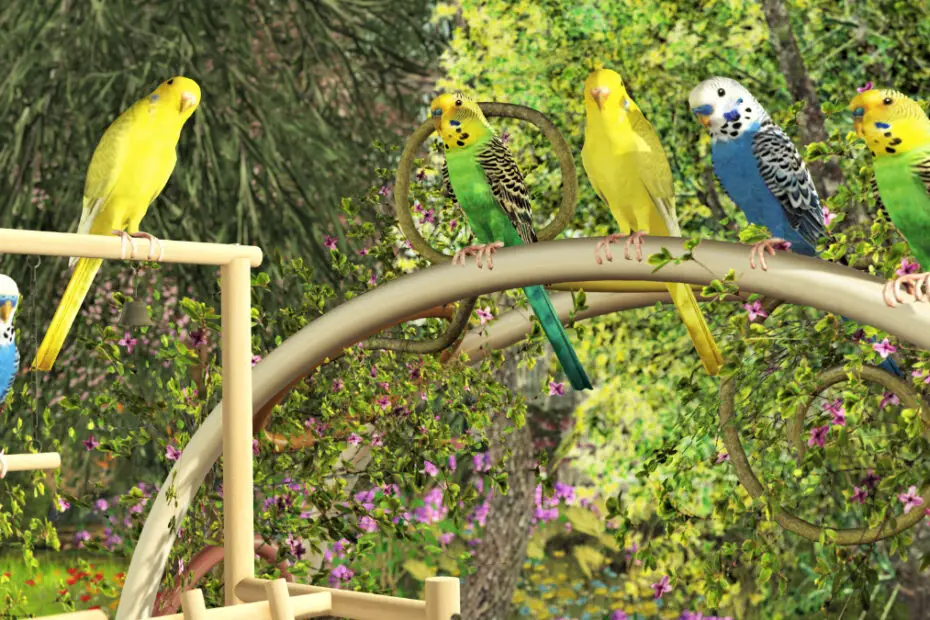You may not find a Budgerigar in the list of the most expensive pet birds. Nevertheless, this exotic bird doesn’t come without a price tag.
So, how much does a budgie cost? Depending on the type of budgie and where you buy it, the average purchasing price will be $10-$100. English budgies would generally be on the higher end of the price. However, you may also need to consider the additional bird ownership cost, including vet care and supplies.
This guide provides more insight into budgie purchasing and ownership costs. Also, we’ll go over some factors that could affect Budgerigar’s price.
How Much Does a Budgie Cost?
Budgie costs depend on two factors: purchasing cost and ownership cost. There’s the one-time purchasing cost and the recurring bird care costs during ownership.
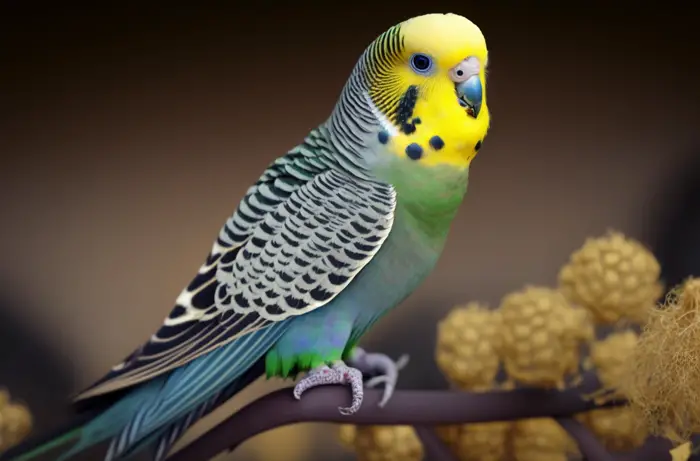
Let’s have a look at the tables below.
Table 1: Budgie purchasing cost
| Budgie Type | Average Purchasing Cost |
|---|---|
| Common Budgerigar | $10-$35 |
| English budgies | $50-$100 |
Recurring bird ownership costs include food, treats, routine vet checkups, and bird accessories. Unlike purchasing costs, recurring costs are the same for all breeds.
Table 2: Cost of ownership
| Veterinary cost | Bi-annual checkups | $60-$80 (Annually) |
| Annual emergency care | Around $100 (Annually) | |
| Bird accessories | Perches | $10-$20 (Annually) |
| Toys | $10-$20 (Annually) | |
| Bowls | $5-$10 (Annually) | |
| Birdbath | $5-$20 (Annually) | |
| Cage | $50-$100 (one-time) | |
| Food | Pellets | $10-$20 (monthly) |
| Treats | Cuttlebone | $5-$10 (monthly) |
Doing the math, the annual cost of ownership will be around $420-$710. However, the cage may need to be bought only once. So, you can subtract its cost for the preceding years.
So, how much do budgies cost? We’re looking at a one-time purchasing cost of up to $100 or more for rare birds. Also, you’ll be spending up to $710 annually to care for your bird.
Budgie Cost of Ownership
Unlike the purchasing cost, budgie care combines different costs. These include veterinary costs, food, bird accessories, and treats. Let’s discuss each expense in detail.
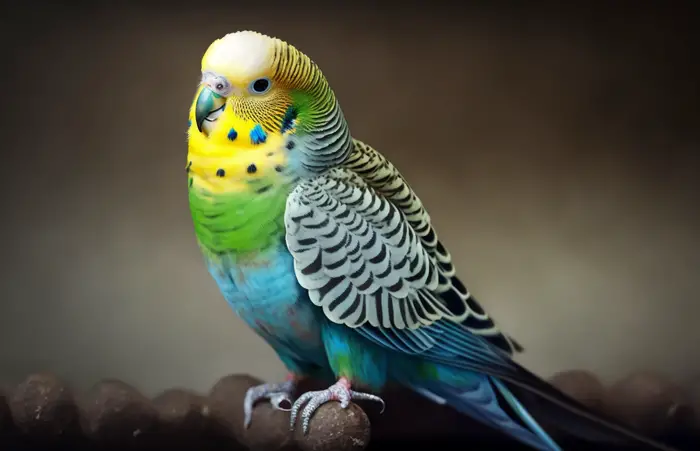
Veterinary Costs
Budgerigars are susceptible to many illnesses, including the highly contagious Avian Gastric Yeast infection. Therefore, a visit to an avian veterinarian is quite unavoidable. The following are common veterinary costs to expect.
- Annual checkups: Budgies need semi-annual health checkups to treat, prevent, or uncover potential illnesses. During this time, your vet may provide grooming services or nutritional advice. Each checkup costs $30-$40.
- Emergency care: Your pet may become ill or injured in between vet checkups. This means you’ll have to pay for emergency veterinary care, which can be around $100 annually.
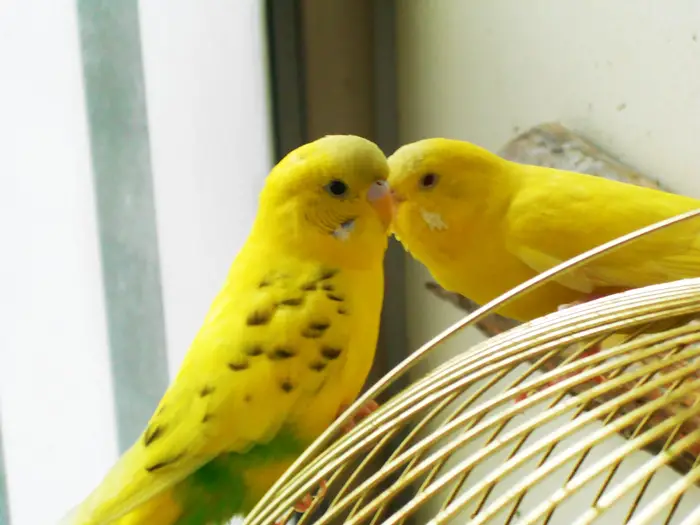
Bird Accessories
You’ll need basic accessories to keep your pet bird healthy and entertained. The following are the most common accessories for budgerigars.
- Perches: Budgerigars need perches to rest on and keep their feet healthy. A cage may need 2 to 3 perches, costing $10-$20.
- Toys: Your bird needs toys for mental stimulation and to prevent boredom. The ideal shopping list for a budgie’s toys includes a climbing rope, a bell, a swing, and chewing wood. A complete, high-quality toy set will cost $10-$20.
- Bowls and bird bath: You should get two bowls to serve as a water dish and a food bowl. Moreover, your pet needs a birdbath to preserve plumage. A pair of high-quality stainless steel bowls cost $5-$10. The typical bird bath costs around $5. However, the more advanced ones will cost around $20.
- Cage: Every budgerigar needs a safe space of its own, hence the need for a cage. The bigger the cage, the happier your pet bird will be. Generally, your bird needs a minimum cage size of 18 x 18 x 18 inches. Good quality cage will set you back $50-$100.
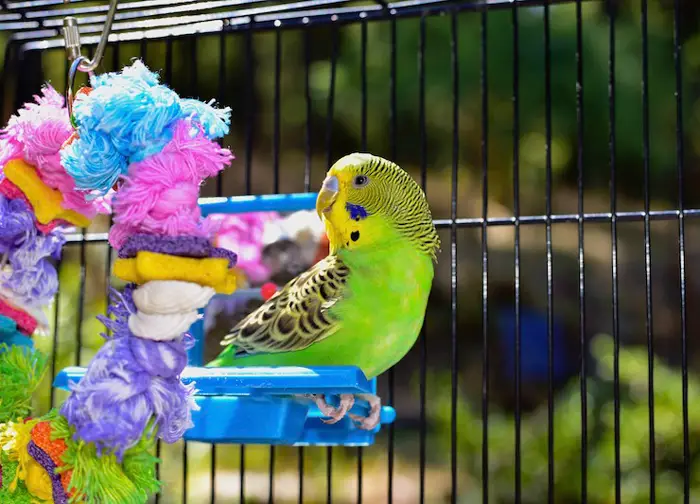
Food
Your bird needs a healthy balanced diet. Here are three common food costs that come with owning a budgie.
- Seed mix: A high-quality seed mix provides essential protein, vitamins, carbohydrates, and minerals, especially during the pre-breeding season. Commercial seed mixes, in particular, may contain up to eight different types of seeds.
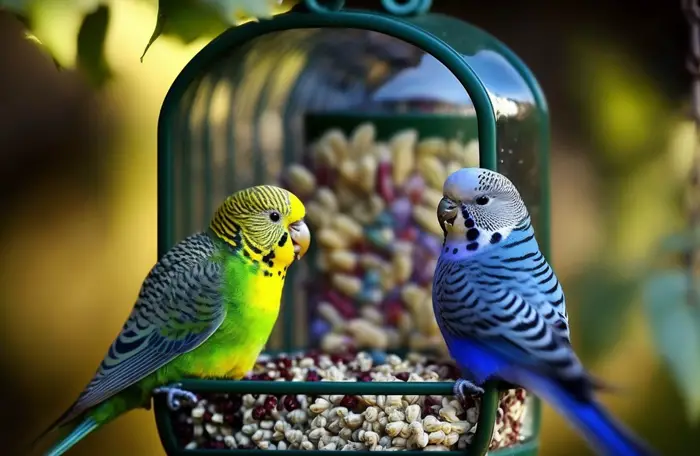
Depending on your bird’s size and feeding routine, you can expect to spend around $15 to $30 monthly on seed mix.
- Fresh produce: Fruits and vegetables provide essential minerals, vitamins, and antioxidants. These should account for 20%-25% of daily intake. Generally, the cost will depend on the season and your location. Nevertheless, you’ll spend around $20-$30 monthly on fresh produce.
- Pellets: Pellets provide a well-balanced diet and contain all the nutrients that budgerigars need. They comprise seeds, grains, fruits, and vegetables blended together. So, you can actually substitute seed mix and fresh produce for pellets. You can expect to spend around $10-$20 monthly on pellets.
Treats
Treats are tasty extras for rewarding your bird. Also, they provide extra nutrition and allow you to bond well with your pet bird. The most popular treats are millet sprays, mineral blocks, and cuttlebone.
Millet sprays will cost between $3 and $5. Cuttlebones and mineral blocks are more expensive, each costing between $5 and $10.
Factors Influencing Budgie Prices
The purchasing price of a Budgerigar can vary depending on several factors. We’ll explore these factors and how they affect Budgerigar prices.
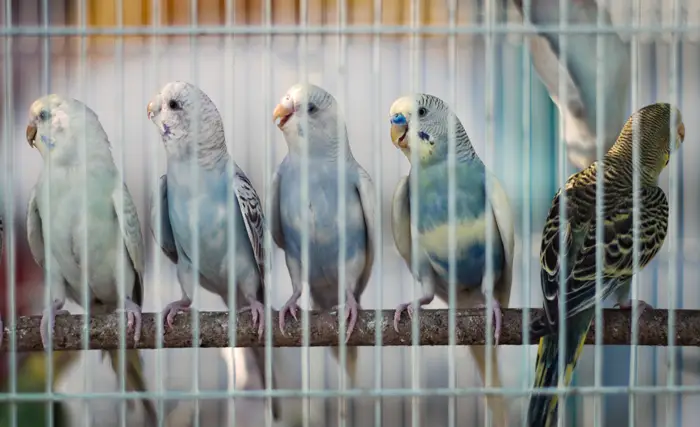
Age
Generally, younger birds cost more than older ones because they have more years ahead of them. In addition, birds younger than 6 months are easier to tame and train and will adapt quickly to their new environment. As such, they will bond readily with their new owners.
Older birds, on the other hand, have exhausted most of their active and social years. In fact, older budgies are susceptible to cancerous tumors of the kidneys and reproductive organs.
Breed
Budgie types and breeds will influence the price. There are two types of budgerigars: English budgerigar, also known as the show budgie or exhibition budgerigar, and Australian/American common budgerigar. English budgerigars are quieter and calmer, and noticeably bigger.
English birds are more expensive due to their rarity, unique feather patterns, and large size. While the American budgie will cost you around $10-$20 in pet stores, the English or the show budgerigar can cost $50-$100, or even more.
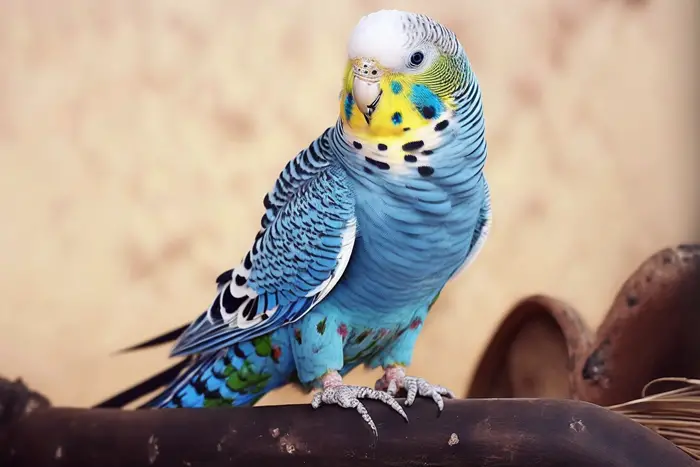
Source
You can buy pet birds from three sources. You can buy your bird from bird stores and breeders or adopt it from a rescue organization.
Budgerigars from reputable breeders are generally expensive, and for a good reason. Bird breeders invest more time and resources to raise high-quality birds. Therefore, you end up with a healthier pet bird, properly bred and socialized.
You’ll get lower prices in pet stores. However, your bird’s health may be less certain. Adoption is the least expensive option owing to the lower adoption fees.
Availability
If the birds are in low supply and the demand is high, then prices will be higher. Conversely, low demand and high supply mean lower prices.
Location
Buying a budgie in urban areas will usually cost more. This is due to the high cost of living, meaning that pet stores and breeders spend more on maintenance. Also, your location will affect availability.
Sex
The sex of a pet bird may also affect the purchasing cost. For instance, females and males have different personalities. Males are more vocal and outgoing, while females are quieter and reserved. Also, breeders may charge more for a bird of a certain sex, especially if it’s in high demand for breeding purposes.
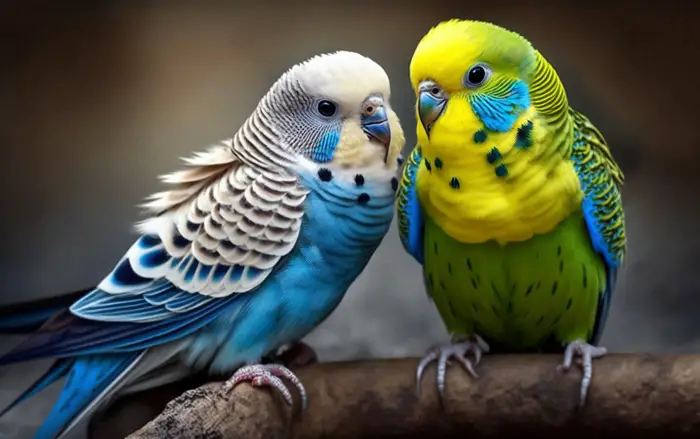
Color
Birds with unique, desirable color patterns will fetch higher prices. For instance, rarer budgie colors like Lutino and albino are more expensive.
A good example is the Rainbow Lutino, which can cost several thousand dollars. Other rare color mutations include the Clearwing, Spangle, and Dark-eyed Clear.
Personality Traits
A more friendly bird will cost more. Also, breeders will charge you more for a bird that’s been trained for particular skills like singing and performing tricks.
Tips For Buying A Budgie At A Reasonable Price
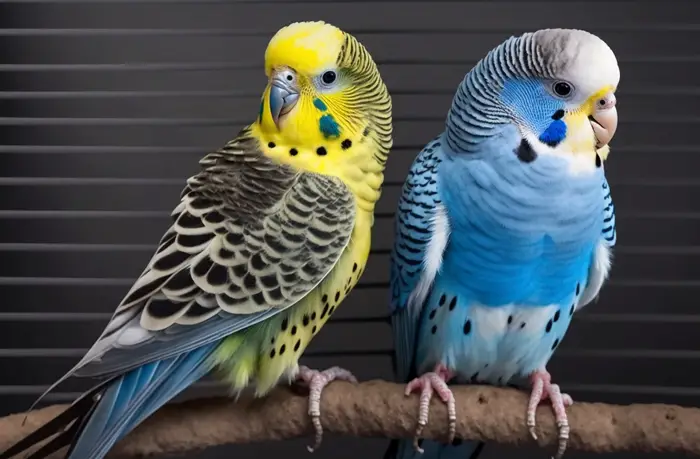
It can be challenging to get a better deal if you’re buying a bird for the first time. Therefore, here are tips to help you get a good bird at a reasonable price.
- Compare prices
You don’t want to be overcharged. Therefore, research the average price of budgies in your local area to get an idea of what you can expect to pay. Also, try visiting different pet stores and breeders. This will allow you to compare prices and get a better deal.
- Try bird auctions
Looking for a bargain on a pet bird? Auctions could be the answer. Many of these birds are sold at a lower cost than those from pet stores or breeders. To find the best deal, investigate auction houses near you.
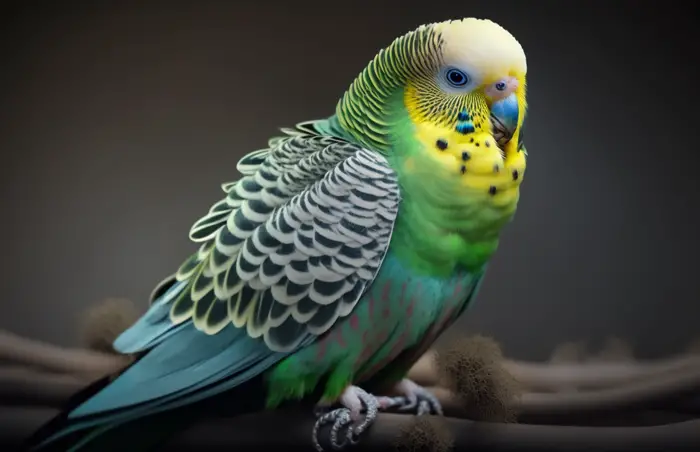
Consider adopting
You can get cheap budgies for sale from a rescue organization. These organizations often have pet birds available for adoption at a lower cost than pet stores or breeders.
Consider buying in pairs
Try buying budgies in pairs. After all, these are social animals that do better when they have a companion. Buying two birds at once often costs less than buying them separately. Also, you can negotiate a better price if you buy multiple birds.
FAQs
Let’s review some questions and answers regarding the cost of owning a budgie.
Budgerigars are generally less expensive. However, birds with rare traits and color mutations may demand considerably higher price tags, some costing up to $10,000.
You’ll need a minimum of $420 and a maximum of $710 annually. However, pet care costs may be a bit lower or higher depending on the cost of living in your area.
It’s always better to buy two birds, preferably male and female, is always better for companionship and reproduction. Moreover, you stand a chance of getting a better deal buying multiple birds.
Conclusion
The cost of a budgie may vary depending on the bird’s age, gender, color, and where you buy it from. While common budgerigars are generally less expensive, show-quality birds and rare color variations demand higher prices.
Regardless of which budgie type you go for, don’t forget to factor in the ongoing expenses for bird’s supplies and medical care. Also, look out for bird auctioneers, as they’re normally sold for a cheaper price to recoup some costs.
